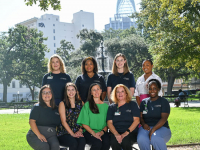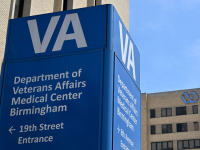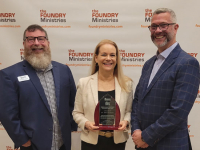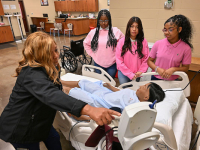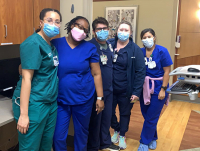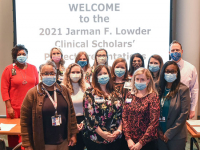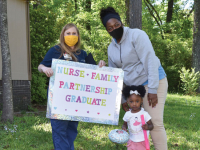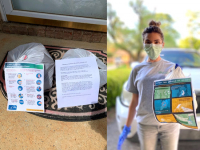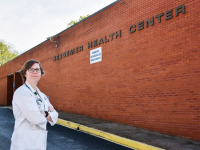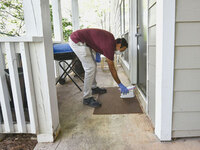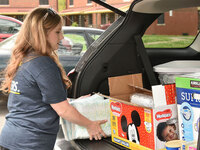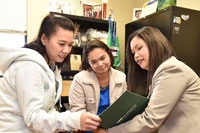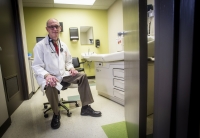University of Alabama at Birmingham (UAB) School of Nursing Assistant Professor Joy Deupree, PhD, MSN, RN, WHNP-BC, and 10 others with ties to the School, University and UAB Health System are among 26 members appointed to the Health Literacy Partnership of Alabama by executive order of Gov. Robert Bentley.
Deupree, a Robert Wood Johnson Foundation Executive Nurse Fellow who has taught health literacy at UAB for 15 years, is chairing the Partnership, which brings together representatives from all areas of the state's health-care community to recommend to the governor ways to improve the health literacy of all Alabamians.
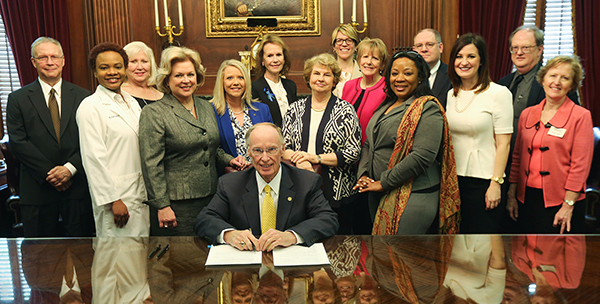 On April 20, Gov. Robert Bentley signed Executive Order No. 18 which officially created the Health Literacy Partnership of Alabama. UAB School of Nursing Assistant Professor Dr. Joy Deupree, fourth from left, will chair the 26-member panel. The Patient Protection and Affordable Care Act of 2010 defines health literacy as “the degree to which an individual has the capacity to obtain, communicate, process and understand basic health information and services to make appropriate health decisions.” Deupree said great improvement is needed in Alabama, a state in which it is estimated 510,000 adults lack basic literacy skills and an even greater number are not considered health literate.
On April 20, Gov. Robert Bentley signed Executive Order No. 18 which officially created the Health Literacy Partnership of Alabama. UAB School of Nursing Assistant Professor Dr. Joy Deupree, fourth from left, will chair the 26-member panel. The Patient Protection and Affordable Care Act of 2010 defines health literacy as “the degree to which an individual has the capacity to obtain, communicate, process and understand basic health information and services to make appropriate health decisions.” Deupree said great improvement is needed in Alabama, a state in which it is estimated 510,000 adults lack basic literacy skills and an even greater number are not considered health literate.“From diagnosis to medication management and discharge instructions, patients are at risk for poor outcomes because they often do not understand how to use the information,” Deupree said. “The support of the governor to establish a meaningful initiative to address health literacy disparities in Alabama is an important development for the health and economic future of our state.”
In simple terms, the Partnership seeks to identify and implement ways to clarify many of the confusing aspects of our health care system. For example, instead of using the term “cardiovascular” in their correspondence or conversations with patients, health-care providers might be urged to use the more easily understood terms “heart” or “blood vessel system.”
Partnership member John Beard, president and chairman of Alacare Home Health and Hospice Services Inc., and a member of the School’s Board of Visitors, offers another practical example to which many can relate.
“When we are at the pharmacy and the pharmacist asks, ‘Do you have any questions about this medication?’ we don’t want to look like we don’t know what we are doing,” Beard said. “So often we will head home without saying anything and when we take the medicine out we go ‘I don’t really know what that technical phrase means.’ We have to find ways to get a better handle on things like that, and I believe we will.
“I am very excited that we are doing this and believe there will be some very positive outcomes from it.”
Providing patients brief, to-the-point reference materials and simple basic facts that indicate precisely what they need to know and do to take care of themselves should improve medication adherence, reduce hospital readmissions and better overall outcomes. In turn, that should help reduce a staggering financial load being placed on the nation’s already overburdened health care system each year.
It was estimated in 2007 that limited health literacy added up to $238 billion nationally in unnecessary costs to the system per year. While no recent studies provide an updated figure, Deupree believes it is now significantly higher.
“We have to do a better job because it is costing us too much, in terms of both money and quality of life for Alabamians,” Deupree said. “When we are looking for ways to solve problems, one obvious place to start is with simplifying patient materials. Health care information is written at a grade level much too high for most patients to understand. Recommendations are that all patient information should be around a sixth grade reading level but research tells us most materials are written at a 10th grade or higher level.”
Nancy Dunlap, MD, PhD, MBA, professor emeritus of medicine, retired Chief of Staff of the Kirklin Clinic at UAB and Partnership vice chair agreed, saying she is sure people feel “very helpless” when they are uncertain what to do to take care of themselves and their loved ones medically.
“In addition to the actual costs, there is the human toll it takes of not being in control of your own life,” Dunlap said. “I am really excited that UAB can help lead the effort to make our state healthier. I also commend Joy Deupree for her passion, her knowledge, her expertise and her persistence in pushing this agenda because I believe it is the right thing to do.”
Beard, who serves on the Board of the Central Alabama Literacy Council and also sees the need to devote far more resources to health literacy, likened the task ahead of the Partnership to that of putting together a puzzle though, at first, the challenge is simply determining the exact size and shape of the puzzle.
“Everybody has a few of the puzzle pieces, but is it 50 big pieces or a thousand little ones?” Beard said. “Our group will look at all things on the list and pick the three or four that are the most obtainable and go to work from there.
“It is a well-designed group. It has the expertise to address a broad range of issues, and that’s important.”
Deupree, who called the formation of the Partnership “a goal of mine for over 10 years” stressed that it has been put into place not just to talk but to take action. The Partnership’s leadership team will develop strategic plans for one, three and five years, with a hope of having some initiatives in place by the end of the first year.
“This is not a public awareness campaign about health literacy,” Deupree said. “We are not looking to do research to figure out the best ways to do this because we already have that information. We will be looking at evidence-based initiatives that can improve outcomes, and we will get started trying to put those in place.
“Alabama is now one of 20 states recognized by the Center for Disease Control as having substantive initiatives dedicated to health literacy, and it is wonderful to see us joining this growing number of partnerships across the nation.”
Other Partnership appointees with UAB Health System or UAB School of Nursing connections include:
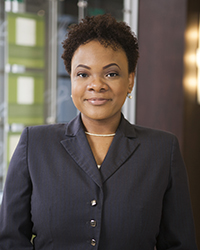 Dr. Ann Gakumo
Dr. Ann Gakumo Peggy Benson, RN, MSHA, MSN, NE-BC, executive officer, Alabama Board of Nursing, and a UAB Health Professions alumna;
Conan Davis, DMD, MPH, assistant dean for community collaborations and public health, UAB School of Dentistry;
Ann Gakumo, PhD, RN, assistant professor, UAB School of Nursing;
Kathleen Ladner, PhD, MSN, RN, co-leader of the Alabama Health Coalition and adjunct associate professor in the UAB School of Nursing;
Nan Priest, BSN, MHA, executive vice president and chief strategy officer, St. Vincent’s Health System, 1978 graduate of the UAB School of Nursing BSN Program;
Wesley Smith, MD, chief executive officer, Alabama Quality Assurance Foundation, 2000 graduate of UAB with a master’s in health administration;
Darlene Traffanstedt, MD, member of State Committee of Public Health, 2001 graduate of the UAB School of Medicine;
Deborah Wesley, RN, MSN, chief nursing officer, Children’s of Alabama, 1986 graduate of the UAB School of Nursing MSN program.

